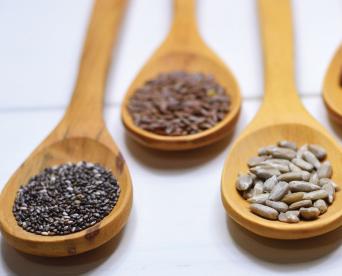
Boost Your Nutrition with Allergy Friendly Foods, Chemical-Free Produce and Sprouting

Trying to eat healthier, whether by avoiding allergens or chemicals or improving your overall nutrition, is a process. When taking the first step, it’s important to know which foods are more likely to cause an allergic reaction, and which conventional fruits and vegetables are more likely to have been treated with pesticides.
Known allergy triggers to avoid include cow’s milk, hen’s eggs, peanuts, soy products, wheat, fish, and shellfish. By contrast, lamb, chicken, pears, apricots, apples and cherries are among the least allergenic. Other acceptable foods are winter squash, sweet potatoes, carrots, and asparagus.
By choosing organic foods, you’ll steer clear of pesticides that exasperate the body’s ability to keep antigens in check. When buying conventional produce, stay away from the “Dirty Dozen” — the 12 vegetables and fruits found to contain the highest traces of pesticides in commercial farming. (Strawberries, kale, and spinach are currently three of the 12.) Also avoid processed food; let “fresh is best” be your mantra and guide you toward eating clean and staying healthy.
Locally, Weavers Way Farms’ fabulous baby kale and arugula are in our stores now. All their fresh, tender greens are packed with vitality; they’re nutritional powerhouses for your meals. And don’t forget microgreens and sprouts, including those from Germantown Kitchen Garden.
When you consider that these types of greens have no stalks or stems to trim, they’re well worth every penny. They tend to be tucked away on higher shelves and are consequently overlooked, so keep an eye out for them! One of our fabulous produce team members will be glad to assist.
While we’re on the subject of “live food,” let’s talk about sprouting. Most folks associate this with beans, which are fantastic, but nuts, seeds and grains can also be sprouted. To release the nutrients inside, you need to soak them for four or more hours in order to break down their enzyme protective coating. Sunflower seeds, pumpkin seeds, and all dark nuts — almonds, Brazil nuts, hazelnuts, walnuts, pecans — need to be soaked; note that you should only start with raw nuts, because roasted ones won’t sprout.
I do my soaking before I go to bed. In the morning, I rinse the seeds well and then start the drying process. A dehydrator is ideal, but not critical. If you’re using a conventional oven, find the lowest setting, and if it’s safe (no little ones underfoot to burn their sweet little digits), you can prop the door if you like. Use a thermometer if you feel the need; I like to dry my seeds and nuts at 110-112° to ensure maximum nutritional value. Many new stoves have built-in dehydrators. (Who knew? Maybe you have one!)
Seeds are much less acidic than nuts — not to mention easier on the pocketbook. A small handful of nuts is really all that should be consumed on a daily basis. Nuts are packed with essential fatty acids and other equally essential nutrients, and because they are so yummy, it’s easy to overdo!
Another great addition to your springtime salads is watermelon radish — they’re as beautiful as they are delicious, and big-time nutritious. Jicama is also a fabulous addition, with the extra benefit of being packed with vitamin C, minerals, folates, pantothenic acid and B vitamins, all nourishing for an allergenic-prone body. I don’t consider a salad done without a good sprinkle of hemp seeds, some crunchy pumpkin seeds and maybe a handful of pomegranate seeds.
Instead of using a fractionated oil for dressings, I make a lighter but just as tasty version using sprouted seeds as the base, chia gel as the carrier and whatever fresh or dried herbs I have on hand. Here’s one of our house’s staple dressing recipes; it’s quick, easy and versatile. We’re voracious salad eaters, and we demand a fabulous dressing — I hope you like it!
Sunflower Herb Marinade
- 2 tbsp. fresh thyme or other herb
- 1-2 cloves garlic
- ¾ cup chia gel (Put 1-2 tbsp. chia seeds in a quart jar, fill it with filtered water, give it a good shake and let it gel, overnight is best)
- ¼ cup pitted olives or organic extra virgin olive oil
- ½ -1 cup sprouted sunflower and/or pumpkin seeds
- 1 tbsp. lemon or lime juice, apple cider vinegar, water kefir or kombucha
- 1 tsp. salt (If you haven’t already made the switch to a high mineral content salt, there’s no time like the present! I like Himalayan, Celtic and Alea; the Co-op carries a lovely apple smoked sea salt in the bulk section)
Blend all ingredients to your desired creaminess and thickness. You can add more water or acid if you like a runnier dressing. The beauty of this recipe is how easily it is modified. Enjoy!
